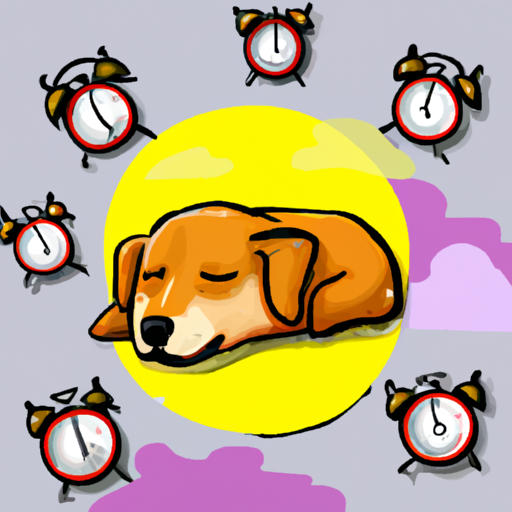As a caregiver, you probably know that a good night’s sleep is essential for your health and well-being. But did you ever wonder how much sleep your furry friend needs? Dogs are not much different from us in this regard. In fact, the amount of sleep a dog needs can vary based on a range of factors such as breed, age, health, and activity level. Let’s dive deeper into understanding how many hours dogs sleep in a day.
H2: Understanding Dogs’ Sleep Patterns
Like humans, dogs have sleep cycles that include stages of wakefulness, rapid-eye-movement (REM) sleep, and non-rapid-eye-movement sleep. However, dogs’ sleep cycles are much shorter and more frequent than ours.
- Wakefulness: This is when your dog is alert and active.
- REM Sleep: This is the stage of sleep when dogs dream. You may notice your dog twitching, whining, or moving their paws as if running during this stage.
- Non-REM Sleep: This is a deep sleep stage when your dog’s body repairs and regrows tissues, builds bone and muscle, and strengthens the immune system.
On average, dogs spend about 12-14 hours per day sleeping. However, this can vary quite a lot depending on your dog’s individual circumstances.
H2: Factors Influencing Dogs’ Sleep
Several factors can influence how much a dog sleeps. Here are some of the most common:
- Breed: Larger breeds tend to sleep more than smaller ones. For example, breeds like Mastiffs and Saint Bernards often sleep for 14-18 hours a day.
- Age: Puppies and older dogs both tend to require more sleep than adult dogs.
- Health: Just like us, dogs may sleep more when they are not feeling well.
- Activity Level: Dogs that are more active during the day will require more sleep to recover.
- Diet: A diet high in protein can help keep your dog energized and active.
| Factors | Sleep Duration |
|---|---|
| Breed | Varies |
| Age | Puppies and older dogs sleep more |
| Health | More sleep when unwell |
| Activity | More activity leads to more sleep |
| Diet | High protein diet can reduce sleep |
H2: How to Ensure Your Dog Gets Enough Sleep
Ensuring that your dog gets enough sleep is vital for their health and well-being. Here are some tips to help your dog get the right amount of sleep:
- Maintain a regular sleep schedule for your dog. This will help regulate their internal clock and promote better sleep.
- Provide a quiet, comfortable sleeping area for your dog. This should be a place where they feel safe and can relax.
- Regular exercise can help your dog sleep better. Just like in humans, physical activity promotes better sleep.
- Avoid feeding your dog late at night. This can cause digestive issues that can disrupt their sleep.
H2: Signs Your Dog May Not Be Getting Enough Sleep
Just like in humans, lack of sleep can lead to a range of health issues in dogs. Some signs that your dog may not be getting enough sleep include:
- Irritability
- Lack of energy
- Difficulty focusing
- Changes in appetite
- Weight gain
- Frequent illnesses
If you notice any of these signs in your dog, it’s a good idea to consult with your vet. They can help determine the cause of the sleep issues and recommend appropriate treatment.
H2: Frequently Asked Questions
Q: How much sleep does a puppy need?
A: Puppies generally sleep for about 18-20 hours a day. This is because they expend a lot of energy growing and exploring their new world.
Q: Is it normal for my dog to sleep all day?
A: While dogs do sleep a lot, they should also have periods of activity throughout the day. If your dog is sleeping all day and not showing interest in normal activities, it might be a sign of a health issue.
Q: What if my dog is not getting enough sleep?
A: If your dog is not getting enough sleep, it can lead to health issues like weakened immunity, irritability, and difficulty focusing. If you suspect your dog isn’t getting enough sleep, consult with your vet.
Q: Can I do anything to help my dog sleep better?
A: Yes, maintaining a regular sleep schedule, providing a comfortable sleeping area, ensuring regular exercise, and avoiding late-night feeding can all help improve your dog’s sleep.
Q: Can dogs suffer from sleep disorders like humans?
A: Yes, dogs can suffer from sleep disorders like insomnia, sleep apnea, and narcolepsy. If you suspect your dog has a sleep disorder, it’s important to consult with your vet.



